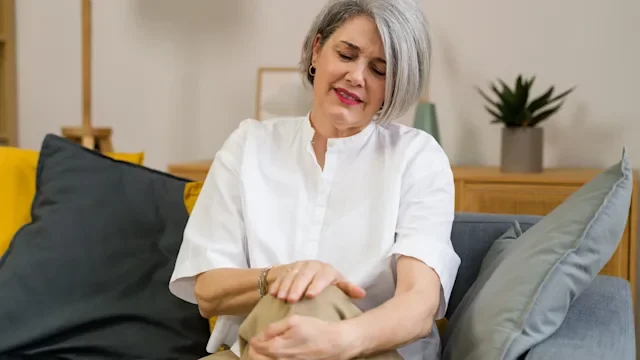Key takeaways:
It can be difficult navigating a chronic condition, but there are resources and communities available to help support you along your journey.
Surround yourself with a care team who listens to you, provides the care you need, and takes the time to answer your questions.
When living with a chronic condition, it’s important to take care of your mental health and physical health and do things that bring you happiness in life.
Save on related medications
As a young woman, Porche never expected to be diagnosed with a chronic illness. She was too busy navigating her life — and planning her future — to even consider that the symptoms she was experiencing may result from something more serious.
Although it was difficult, her Crohn’s disease diagnosis journey helped her become the person she is today, with many lessons in self-advocacy learned along the way. What began as a second opinion turned into a 2-year journey attempting to get an answer.
Today, Porche is using her voice to tell her story to help others and bring awareness about how chronic illnesses affect Black, Indigenous, and People of Color (BIPOC). Read on to learn about her diagnosis journey.
What is Crohn’s disease?
Crohn’s disease is a chronic condition where your immune system — which normally fights off germs — starts attacking your gastrointestinal (GI) tract. It can affect people differently, but most people commonly experience stomach pain and discomfort, diarrhea, fatigue, bloody stools, and weight loss. And sometimes, the condition can result in serious complications that require surgery.
For Porche, it started as pain and bloody stools. As a young woman without a family history of Crohn’s disease, she assumed that it was something far more simple. But as time went on and as her symptoms persisted without resolution, she knew that it was time to see her provider for help.
Journey to diagnosis
Although she had an established primary care provider in her home state of North Carolina, Porche rarely saw them outside of when she would get a cold every few years. Once the symptoms started, she saw her provider several times over the course of a few weeks, trying many different treatments. Despite these efforts, her symptoms wouldn’t let up.
At that point, her provider referred her to a specialist — a gastroenterologist — who could do further testing to figure out what was going on.
Referral to a specialist
After meeting with the gastroenterologist, it was determined that she had an anal fistula — an infected tunnel between the skin and the anus — that was causing her pain and bleeding. Two months later, she underwent surgery to have it removed and examined for a diagnosis.
A few months after the surgery, she finally got a diagnosis — it was confirmed that she had Crohn’s disease. But for an otherwise healthy young woman like Porche, this conclusion didn’t make sense. She decided to get a second opinion.
Getting a second opinion
Shortly after she was initially diagnosed with Crohn’s disease, Porche moved to Houston, Texas. This meant starting over in a new city with a new provider in an attempt to get answers. Unfortunately, this was the beginning of a cycle of provider visits and surgeries, all while she continued getting painful fistulas.
She spent her first year in Houston with a specialist who couldn’t pinpoint the cause of her symptoms and refused to diagnose her with Crohn’s disease. During this time, her surgeon — who was needing to remove fistulas every 3 to 4 months — told her that she would continue getting them until she started medication. However, this required her specialist to diagnose the condition and prescribe medication — which the specialist wouldn’t do.
Over the course of the year, Porche grew justifiably frustrated. She couldn’t understand why her provider seemingly didn’t want to “put in the work” to figure out what was going on. At that point, she felt like a number, not an individual, and decided to find a new provider.
Unfortunately, the next provider wasn’t much help, either. He shrugged off her concerns and didn’t seem interested in helping her. “For someone who is Black, the medical world is a little bit harder to navigate because medical professionals sometimes don’t take you seriously. I wasn’t getting the assistance that I needed,” Porche told GoodRx.
It became clear that this provider wasn’t going to help her, either. Porche knew that she deserved better care and changed providers once again.
Getting an answer
Although it took a while to get an appointment, Porche finally was able to see someone who would help her. The third provider diagnosed her with Crohn’s disease — 2 years after her initial diagnosis — and started her on medication for the first time.
Finding treatment that works
There are several different types of medications used to treat Crohn’s disease. Which ones your provider prescribes you depends on a number of factors, including your symptoms and areas of your body affected by the condition. For many people, biologic medications — injections that are made from living organisms — are the first-choice treatment.
Porche initially started taking Humira, a biologic medication that you can administer to yourself at home. And while being able to start treatment was a relief, she wasn’t feeling any better and ended up with another fistula that required surgery. At this point, Porche knew that it was time to stop Humira — and leave Houston.
After moving back to North Carolina, Porche needed to be hospitalized for 1 to 2 weeks due to an abscess (a collection of pus) that burst. She knew that she needed to find the right medication that would keep her condition under control.
Finally, she was started on Remicade, another biologic medication that needs to be infused by a healthcare provider. The good news is that since starting treatment, she hasn’t had any anal fistulas and feels as though she’s able to live a normal life.
Lessons learned
Unfortunately, Porche’s challenging diagnosis experience isn’t an isolated one. It can be a very overwhelming and frustrating journey for many who face a similar reality.
But when asked if she would change anything, she said that she wouldn’t. She believes that everything happened for a reason. The lessons learned and skills developed over those 2 years have helped her grow in every other aspect of her life.
Build a good care team
Over the course of her diagnosis journey, Porche learned a lot about what she needed from a care team to best manage her health. After seeing several providers who were dismissive of her concerns and didn’t listen to her, she finally found a team who was truly invested in helping her — and didn’t treat her like she was just a number.
She learned that sometimes you need to leave when a provider isn’t a good fit. When describing how she felt when she wasn’t getting the care she needed, Porche said, “My time is valuable. I’m coming to you [provider] for a service, and you’re not helping me.” At one point, she waited over an hour to be seen, only to end up rescheduling. She remembered thinking, “This is my time, too. I’m sick, and I’m wasting time here.”
When you’re building your care team, it’s important to research providers to find one that will work for you. Porche has found that reviewing their medical experience and reading online reviews is helpful in finding someone who’s a good match.
Learn to advocate for yourself

She started looking for information about Crohn’s disease to better inform herself about what was potentially causing her symptoms. Although she didn’t believe it at first, it became clear that what she was experiencing was consistent with Crohn’s disease. That’s when she realized that she needed to take her health into her own hands and find people who could best support her.
Through this process, she learned that it’s important to speak up — especially when you feel as though you aren’t being heard or getting what you need, and if the advice you’re receiving isn’t in line with your health.
Today, Porche makes a point to write down any questions that come to mind before her appointments to make sure that all of her questions are answered. If she thinks of something after her appointment, she uses the provider’s online portal to submit them electronically. And for those people who feel like they can’t advocate for themselves, she recommends bringing someone along, like a friend or family member, who can ask questions and speak up for you.
Tools and strategies for living a healthy life
Although her symptoms are mostly under control with Remicade, Porche has been able to identify other factors in her life that sometimes contribute to symptom flare-ups. Approaching her health more holistically has enabled her to take control and live a normal life.
Stress management
Stress management is key in many inflammatory disorders, and Crohn’s disease is no exception.
Porche realized that stress plays a significant role in her condition. When she’s stressed out, she experiences more symptoms. Because of this, she tries to manage her stress better and uses techniques like breathing exercises to keep focused and calm.
Mental health support
Living with a chronic condition can be difficult, so it’s important to take care of your mental health — in addition to your physical health. There are a number of ways to support your mental health, and it’s best to use the strategies that work for you.
For Porche, she found considerable support from therapy. Self-care activities have also helped her maintain a positive outlook on life. She tries to make a point of doing things that she enjoys, like getting massages and pedicures.
Connecting with others
When you’ve been diagnosed with a chronic condition, it can be helpful to connect with others going through a similar situation to share stories, resources, and advice. There are many online communities and resources for chronic conditions available, but sometimes it can be difficult finding ones that are specific to your unique experience. When looking for community support, Porche said that “I didn’t see people who looked like me.”
Porche was able to access a lot of great resources through the Crohn’s and Colitis Foundation, which is one of the largest communities for Crohn’s disease and people who’ve been recently diagnosed and those who’ve been living with the condition for years.
But it was through this community that she also found the Color of Crohn’s and Chronic Illness (COCCI), an organization that works to improve the quality of life for BIPOC with the condition. Because she wanted to share her story and bring about awareness for how Crohn’s disease affects people with a similar lived experience, Porche became an ambassador for the organization.
Porche said that “If I would have had more of a community of people that looked like me that were also going through the same thing, I probably would have been able to advocate for myself earlier.” Today, she is an advocate and resource for those going through a similar journey.
As a COCCI ambassador, Porche is a voice for the community — sharing her experience, participating in fundraising events, and leading virtual support groups.
The bottom line

Why trust our experts?

Being diagnosed with a chronic condition can be overwhelming, and it can be a difficult journey to reach a diagnosis and find treatments that work for you. It can take work to maintain a positive outlook on your health, especially when you feel as though you aren’t receiving the care that you need.
For Porche, those 2 years of her life taught her many lessons and helped her find her voice. Now, she uses her voice as a COCCI ambassador to share her story and support others who may be going through a similar experience. Because she is willing to “put in the work” and invest in herself, she’s able to live a happy and fulfilling life and inspire others in the process.














